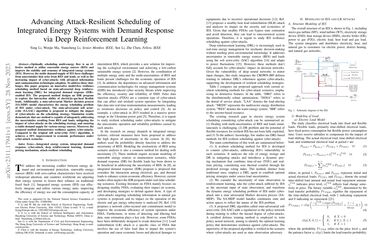Advancing Attack-Resilient Scheduling of Integrated Energy Systems with Demand Response via Deep Reinforcement Learning
Optimally scheduling multi-energy flow is an effective method to utilize renewable energy sources (RES) and improve the stability and economy of integrated energy systems (IES). However, the stable demand-supply of IES faces challenges from uncertainties that arise from RES and loads, as well as the increasing impact of cyber-attacks with advanced information and communication technologies adoption. To address these challenges, this paper proposes an innovative model-free resilience scheduling method based on state-adversarial deep reinforcement learning (DRL) for integrated demand response (IDR)-enabled IES. The proposed method designs an IDR program to explore the interaction ability of electricity-gas-heat flexible loads. Additionally, a state-adversarial Markov decision process (SA-MDP) model characterizes the energy scheduling problem of IES under cyber-attack. The state-adversarial soft actor-critic (SA-SAC) algorithm is proposed to mitigate the impact of cyber-attacks on the scheduling strategy. Simulation results demonstrate that our method is capable of adequately addressing the uncertainties resulting from RES and loads, mitigating the impact of cyber-attacks on the scheduling strategy, and ensuring a stable demand supply for various energy sources. Moreover, the proposed method demonstrates resilience against cyber-attacks. Compared to the original soft actor-critic (SAC) algorithm, it achieves a 10\% improvement in economic performance under cyber-attack scenarios.
PDF Abstract
